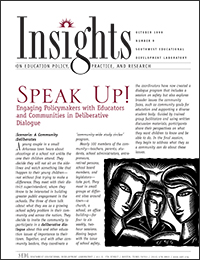Speak Up! Engaging Policymakers with Educators and Communities in Deliberative Dialogue
Scenario: A Community Deliberates
A young couple in a small Arkansas town hears about shootings at a school not unlike the one their children attend. They decide they will not sit on the sidelines and watch something like that happen to their young children—not without first trying to make a difference. They meet with their district superintendent, whom they know to be interested in building greater public engagement in the schools. The three of them talk about what they see as a growing school safety problem in their community and across the nation. They decide to invite the community to participate in a deliberative dialogue about this and other education issues of importance to their town. Together, and with other community leaders, they coordinate a “community-wide study circles” program.
 |
Nearly 100 members of the community—teachers, parents, students, school administrators, entrepreneurs, retired persons, school board members, and legislators—take part. They meet in small groups at different sites around town—a church, a school, an office building—for four to six weekly, two-hour sessions. Having begun with the issue of school safety, the coordinators have now created a dialogue program that includes a session on safety but also explores broader issues the community faces, such as community goals for education and supporting a diverse student body. Guided by trained group facilitators and using written discussion materials, participants share their perspectives on what they want children to know and be able to do. In the final session, they begin to address what they as a community can do about these issues.
In many of these communities, education decisionmakers are turning to some form of structured dialogue as a civil, inclusive, and meaningful way to engage the public in addressing issues of common interest.
The citizens of this Arkansas town chose to participate in study circles, a particular method of public engagement that offers participants a structured process and resources for deliberating about important community issues, such as public education. Communities such as this one—struggling with a particular issue like student safety, equitable school resources, or student achievement—are turning to deliberative dialogue to work through the challenges.
In other communities, school board members and administrators work to encourage more public involvement in and support of their public schools. They recognize that achieving public support for local school reform and improvement is more likely to happen and be sustained when school and district goals fit with the educational goals of the community. In many of these school communities, education decision makers are turning to some form of structured dialogue as a civil, inclusive, and meaningful way to engage the public in addressing issues of common interest.
Regardless of the impetus, policymakers, educators, or community members who initiate deliberative dialogue on education expect that participants will:
- openly share their diverse perspectives and concerns;
- come to understand the complexities of education issues their community faces; and
- identify solutions to education problems, as well as reasons and ways the community can support and be involved in education.
This edition of Insights on Education Policy, Practice, and Research looks at the definition, potential, and issues related to the use of deliberative dialogue to connect policymakers, educators, and the general public. Future articles in the Insights series will examine SEDL's findings about the effects of the study circles model of deliberative dialogue on state education policymaking (see sidebar below for information on SEDL's work in this area) For information on how to choose and implement a deliberative dialogue model, contact one of the organizations in the table below.
Next Page: What is Deliberative Dialogue?

